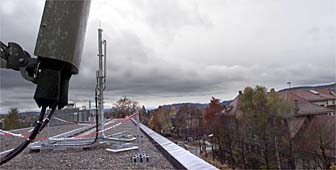Business fears tighter controls on mobile antennae

Swiss business is warning that moves to limit new antennae for mobile phones risk damaging one of the country's fastest growing sectors.
Growing concerns about “electrosmog” – caused by electromagnetic radiation from antennae – have prompted calls for a moratorium on the building of new antennae. Supporters of a ban launched an initiative this week to try to force a nationwide vote on the issue.
Business leaders counter that the fears are overblown and that such a ban would seriously damage competitiveness in one of Switzerland’s key industries.
René Buholzer, a director of the Swiss business federation, economiesuisse, said fears about electrosmog could be detrimental to the economy. “If laws are tightened further, we fear for the competitiveness of Swiss business,” he told swissinfo.
Health problems
But those backing a ban say evidence is mounting that people living close to antennae suffer serious health problems as a result.
“There are many indications that people living close to antennae are suffering health problems as a result,” the initiative’s author, Stefan Day, told swissinfo.
He said the mobile phone industry should be required to prove that the antennae are harmless before any more are built.
“We believe that if expansion is stopped, and scientific investigations are made into whether radiation is harmful, then parliament can make a decision about allowing or prohibiting the construction of these antennae.”
Day’s views are supported by the Swiss Energy Foundation, whose president, Inge Tschernitschegg, told swissinfo that electrosmog was implicated in many disorders. “People living near antennae are getting ill as a result: they cannot sleep at night, they have heart problems, headaches and are always tired.”
Economic impact
A recent study by a research firm, Basel Economics, concluded that moves to curb new antennae would lead to a year-on-year drop in GDP of 0.1 per cent.
An economist at the firm, Martin Eichler, told swissinfo that the industry employs 2.5 per cent of the Swiss workforce and accounts for three per cent of GDP.
“The growth of this sector is still very high [despite the downturn] so it contributes quite a bit to economic growth. If regulations do not allow the adoption of new technology in the mobile communications sector, future growth will be much smaller than predicted. Swiss GDP will drop as a result by 0.1 per cent per year.”
The Federal Office for Communication is against any moves to prohibit new antennae. It says levels of electromagnetic radiation in Switzerland are ten times lower than international limits set by the World Health Organization, and that growth would certainly be jeopardised by tighter controls.
“If we were to cut down radiation levels, we wouldn’t be able to communicate by mobile phone anymore,” deputy director, Marc Furrer, told swissinfo.
He added that Switzerland already has some of the strictest controls in the European Union, and that these ensure that radiation is harmless by the time it reaches populated areas.
“We have to seek a balance between infrastructure and environmental and health concerns. We certainly shouldn’t be stricter – we should interpret these rules in a way that allows an extension of the infrastructure to make second and third generation mobile phone services possible.”
If Day manages to collect the necessary 100,000 signatures in support of his initiative, the issue will be decided by voters at the ballot box.
by Samantha Tonkin

In compliance with the JTI standards
More: SWI swissinfo.ch certified by the Journalism Trust Initiative









You can find an overview of ongoing debates with our journalists here . Please join us!
If you want to start a conversation about a topic raised in this article or want to report factual errors, email us at english@swissinfo.ch.